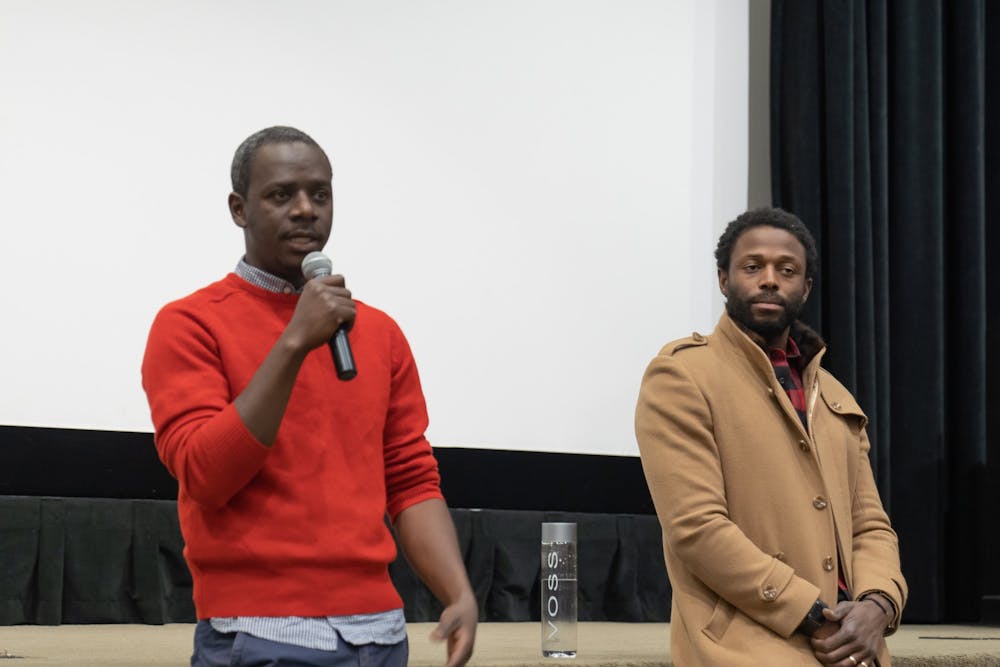The night of Tuesday, March 3 was Super Tuesday in the United States, an evening that saw a national party picking a face to battle what many see as dangerous extremism in the Oval Office. The same night at Newcomb Theater, extremism was also being tackled by the Senegalese film “Baamum Nafi” — optionally translated as “Nafi’s Father.” Director and writer Mamadou Dia filmed the project in his hometown, utilizing mostly untrained actors.
The film was made with the help of Dia’s longtime collaborator and executive producer Maba Ba, who met him while the two both studied at New York University’s film school. While “Baamun Nafi” is no doubt a grassroots production, Dia’s pedigree as a storyteller of both fiction and nonfiction speaks for itself. Dia worked as a guest correspondent covering the African continent for The Associated Press. In 2016, his narrative short “Samedi Cinema” garnered international acclaim at film festivals, including those in Toronto and Venice.
The journalistic experience Dia brings to the table informs much of his cinematic style, which in “Baamum Nafi'' sees a small town conflicted over religious extremists who sublty assert themselves into power. Shallow depth-of-field which lazily racks focus on faces, naturalistic lighting that accents scenes with soft beauty and the authentic nature of the film’s production contribute to an aesthetic more akin to documentary storytelling than anything usually found in feature film. Speaking to the title, Dia struggled to account for the dual protagonists — Nafi and her father. “In film school there’s this idea that you need to follow one character,” Dia said. “I wanted a title that combines the father and daughter.”
Nafi’s father is the town’s Imam — a type of religious and communal authority — colloquially referred to as Tierno (Alassane Sy). Tierno is skeptical of his daughter Nafi’s desire to marry and go to university, while his brother Ousmane (Saikou Lo) hopes Nafi will marry his nephew and sees opportunity from money offered by a visiting Sheik and his religious faction. What follows is a powerful, sometimes deeply dark and sometimes genuinely funny tale of family strife set against a town being radicalized by Islamist extremists.
Dia confirmed the film’s themes of extremism were no accident in a Q&A session following the screening. “How do I do a movie about the process of getting into extremism?” Dia asked himself while studying at New York University, as Donald Trump was elected president in 2016. Most importantly, he wanted to highlight extremism occurring in a stable society where one wouldn’t expect it to ever take hold. The religious themes mattered too. “Sub-Saharan Africa is different … We live in different ways,” Dia would always tell friends when asked about the way he practiced Islam. Traditionally Senegalese Muslims coexist peacefully with other religions, even amongst family members. Dia wished to expose how radicalism breaks that harmony down.
While the Newcomb Theater screening was the film’s first public screening in the United States, Dia and Ba recalled showing it in their home country to an audience of almost 400. For the first two screenings, they struggled to get any media coverage — which Ba attributed to problematic distribution practices in Senegal. Just as most of the film’s actors had never been on a movie set — save for the two brothers — many who saw the screening in Senegal had never seen a movie presented on the big screen. It was not until the film was later shown in the capital city of Dakar that the national media showed up to cover the event, to the frustration of Ba and Dia.
During filming, Dia mentioned the benefit of working with local actors in his hometown. “I knew what I could ask for any one of them,” Dia said. They ran a workshop for the inexperienced actors and wrung impressive performances from them by staying true to life and not even explicitly rehearsing scenes beforehand. While not entirely improvised, the dialogue and moment-to-moment story in the film feels spontaneous and real. Beyond being an exceptional film in its own right, “Baamun Nafi” makes a powerful case for increasing the diversity and inclusivity of cinema abroad.
Touching further on the film’s caution of extremism, Dia opened up during the question and answer session on how his film offered vignettes of resistance. An incompetent mayor in the film represents corrupt or weak state governments, while young characters who play soccer and listen to music represent a more powerful form of individual protest and expression. Social media and smartphones contribute to the myriad influences affecting the impressionable youth in “Baamum Nafi.” The film understands that for good or bad, children are strongly influenced by the adults and media around them.
While the film is currently being toured around international film festivals and experiencing limited release in the form of private screenings, a wider release strategy through theaters or streaming platforms has not been confirmed yet. Should audiences have a chance to see Dia’s latest film, they will be well-rewarded for immersing themselves in an authentically specific narrative that speaks to universal truths.







